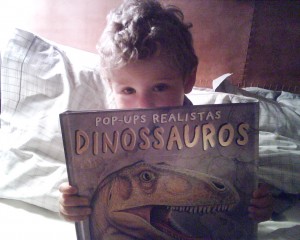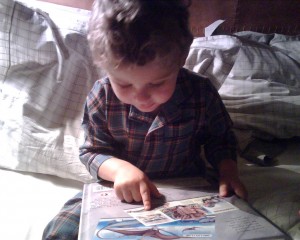About Children, Reading, and Picture Books
Sad News

About a month ago, as I excitedly shared with a friend my journey of writing a children’s picture cookbook, I learned that “the New York Times had an article according to which picture books are over”.
I argued that it was not possible, picture books are a fundamental part of learning how to read, and pictures play a key role in supporting young readers’ feeling of success when pretend-reading, etc. He forwarded me the link to the article so, as soon as he left, I ran to the computer to read it.

As it turns out, picture books sales have been slowing down, and the article writer, Julie Bosman, assembles a range of information to try to paint a picture of what is happening to cause that. One of her findings was that “Parents have begun pressing their kindergartners and first graders to leave the picture book behind and move on to more text-heavy chapter books.”
Although there was an incredibly long thread of responses from parents arguing that it is the schools’ fault, a few days after reading this article, I had an interaction with a 1st grader that saddened me.
A Light from the Field
Subbing in a charter school where reading is experienced workshop style, during which children have freedom to choose books that are ‘just right’ for them, I noticed one particular boy holding a chapter book in his hands. He had the bookmark somewhere around the first third of the book, but it seemed to me that he was just staring at the pages. I walked around, helping students get settled in reader’s workshop, supporting children who needed to make a choice of a book to read, or who had questions. After five minutes, that boy asked to go to the restroom. I granted permission, he returned a few minutes later.
As sharing is a big part of the reading experience, like Debbie Miller, Ruth Routman and others advocate, buddy reading is encouraged in the workshop approach. About ten minutes into independent reading, I announced that if they wanted to read with a friend, they could. The same boy, chapter book in hands, asked to go to the restroom again. That’s when I connected the dots.
I told him he would need to wait until recess, which would happen in another ten minutes. I added that he had two choices: he could find a quiet space to keep reading his book, or he could find a buddy to read with. I asked what his book was about, and he seemed to know, so I suggested: “How about you read to me? I would love to be your buddy and hear some of that story.” My experience with first and second graders has shown me they LOVE reading to an adult, they glow as if it is a privilege that a grown up is listening to them tell a story rather than the other way around. His response, however: “I… I can’t read this book.”
Where is the pressure coming from?
My heart sunk to think that this boy spent some fifteen minutes holding in his hands a book he could not read while everyone else engrossed in adventures and discoveries. I began to wonder where the pressure came from – it sure was not from the teacher: there were plenty of books leveled for less fluent students, who actually seemed quite proud and possessive of the book boxes that were, as they told me, “just for us”.
One of the mishaps of being a sub is that we take part in one chapter of children’s lives, which makes it difficult to really support their evolution and growth. Without the full story, I can only hypothesize contingencies that led this boy to choose a book he cannot read.
With an understanding of the school’s and teacher’s policies concerning reading, I could easily fall in the trap of blaming the parents for forcing an early maturation of their child. However, as much as children are usually quick to embrace learning adventures, around the age of 5 they also become painfully self-conscious, if not about reading, about their performance in sports, or about whether their tooth fell off like others in their group or not. The consequence is that, if a friend moves on to chapter books because it is his interest and it falls into his reading ability, the other friend who is not thoroughly supported and valued for where he is in his own reading development will feel lessened. The same will happen if this child does not loose a tooth when his friend does.
What I learned from it
I don’t think that this picture book issue is about assigning blame; I see it as an alert.
As a reading teacher, my job just gained a new perspective: to advocate for the different styles of reading, and for the various types of writing. A novel is not a better book than a philosophy book, they serve different purposes. The same way, a child who reads pictures has different skills than the child who reads words. As Julie Bosman puts it: “Literacy experts are quick to say that picture books are not for dummies. Publishers praise the picture book for the particular way it can develop a child’s critical thinking skills.”
That does not mean one type of reader will not learn what the other knows, but as a teacher my role is to stimulate them to share with one another the treasures of their knowledge and to support both to grow as much as they can in all areas, to develop as complete, rich, beautiful human beings. In their pace, using their skills.
In “real life”, I proofread what my husband writes, and he helps me overcome my technological roadblocks. We learn from one another, but my strength is the word, and his is the programming.
Response to "About Children, Reading, and Picture Books"
Gu, apesar de ser um “balde de água fria” ler um artigo contrário ao que você está trabalhando, fiquei feliz de entender que você seguirá em frente! O livro vem de um sonho e uma idéia de aplicação que vem da experiência em campo, não? Sendo assim, não deve se preocupar tanto com o mercado…pelo menos não nesse momento. O Dia que você quiser fazer um livro bestseller, aí sim. Enquanto isso, viva as diferenças e ainda bem que há profissionais que se preocupam com as particularidades e desenvolvimento das crianças, sem se deixar levar totalmente pela “ordem” do momento.
Bjão e todo meu apoio, como sempre!
É, Nan, minha primeira reação foi de rebelião, e corri pra buscar artigos na International Reading Association que me dessem argumentos e base para o que eu acredito ser real. Encontrei artigos bárbaros, e talvez ainda escreva algo sobre eles. Como Reading Specialist (meu título depois do mestrado) é importante eu articular as pesquisas e teorias correntes – que contradizem a idéia de apressar a leitura de palavras, e apóiam o desenvolvimento da leitura como vivência. Nesse post, porém, resolvi não escrever um tratado, e falar mais sobre minha experiência. ADORO que voce acompanha e opina.
Beijos!
Oi Guga,
A gente nao se encontra em carne e osso faz tempo, mas nos achamos na web, legal. 🙂
Precisamos por os assuntos em dia.
Boa sorte com o livro. Nao desiste. Sempre ha’ espaco pra’ quem tem talento e quem sabe o seu ajude a mudar essa tendencia. Alias, sera’ que essa tendencia que a Julie mencione nao se aplique a uma idade especifica e a tendencia seja justamente ao contrario em outra certa idade? Talvez haja um mercado crescente em outra faixa etaria, nao sei exatamente qual a que voce tem em mente.
Beijos.
Oi, Duda! Que legal ter sua participação aqui!
Então, essa ‘tendência’ foi muito discutida nas respostas de pais e professores ao artigo do NYT. Alguns argumentaram que é uma pressão das livrarias e editoras para ter mais leitores de palavras devido ao alto custo da impressão de picture books.
Um dos artigos da International Reading Association que eu li fez muito sentido, defendendo que quando estamos dirigindo é comum guiarmo-nos por informações visuais como restaurantes, casas, edifícios, postos de gasolina etc.
Eu acho que tem muita gente bem intencionada, mas mal informada que de fato acha que ler se resume às palavras. Independente de serem pais, professores, ou legisladores, eu não desanimo do meu projeto por saber que a aprendizagem da leitura começa com a linguagem visual – que continua sendo importante até para mim, que sou alfabetizada e gosto de ler.